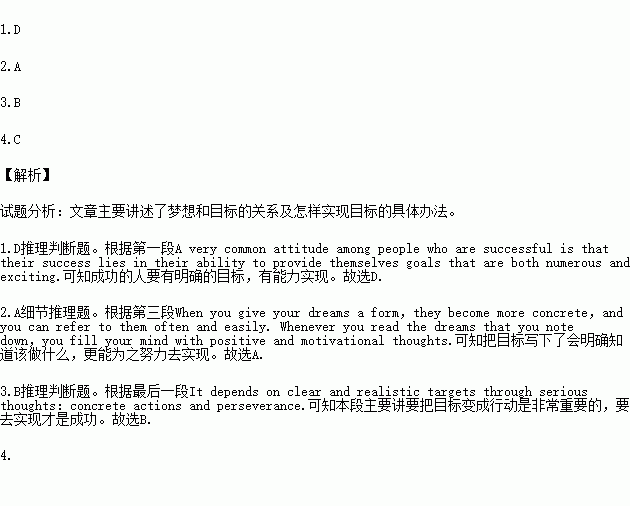题目内容
Remember that goals are dreams with a timetable. Our goals are important for us to create what enriches our life. A very common attitude among people who are successful is that their success lies in their ability to provide themselves goals that are both numerous and exciting. When you think about your future,you are helping to feed a long-term goal of what you want to create.
To realize your dreams,you must translate your vision into a series of actions you can take as soon as possible. You should be able to measure these results,to make sure they take you wherever you want. And this step should not be viewed lightly! Indeed,very few people set goals and concrete actions for themselves to achieve. Very few people note what they want to accomplish,and know each day whether they have indeed advanced in the direction of their dreams.
Therefore one of the secrets that you can get results from is to write down your goals on paper first. When you give your dreams a form,they become more concrete,and you can refer to them often and easily. Whenever you read the dreams that you note down,you fill your mind with positive and motivational thoughts.
Unfortunately,many people stop there. They just simply make wishes, hope and wait. These people do not bring positive difference in their lives,because that sort of behavior is just wishful thinking. Success is not at all a miracle. It depends on clear and realistic targets through serious thoughts:concrete actions and perseverance(毅力). Don’t forget,your past does not determine your future. Only you now is your potential!
1.People can achieve success commonly in that they .
A. have many dreams
B. are well-informed of how goals go
C. think a lot about their bright future
D. know what the goals are in their life
2.If you put down your goals on the paper,you can .
A. know clearly what should be done
B. make them accomplished smoothly
C. measure the results of the goals easily
D. mention them easily to others
3.The last paragraph mainly tells that .
A. having dreams is very important to everyone
B. to translate goals into concrete actions is important for success
C. what people did in the past affects what the are today
D. most people can make a difference in their life
4.What is the best title for the passage?
A. The Path towards Your Targets
B. The Process of Making Goals
C. The Power of Your Goals
D. The Importance of Your Success

